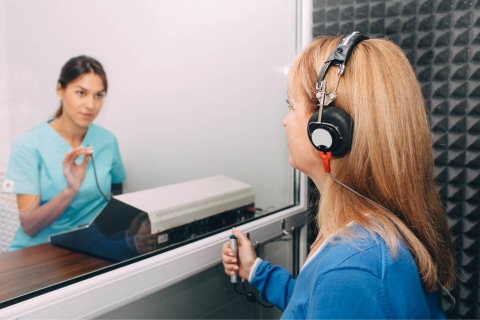Should You See an Audiologist?
Audiologists work with patients of all ages, treating infants, children and adults for a variety of hearing and balance problems—they provide services that include:
- Fitting and dispensing hearing aids
- Administering hearing and balance tests
- Assessing candidacy for and programming implantable hearing devices (e.g., cochlear implants, bone-anchored hearing aids, etc.)
- Counseling patients and their families on communication strategies
- Designing and implementing hearing conservation programs and newborn hearing screenings
- Providing aural rehabilitation programs
- Performing ear-related surgical monitoring


How Is Hearing Loss Treated?
1. Setup an Appointment
We can help you schedule an appointment with the right specialist for your needs. Hearing loss is common, and an in-person visit is the first step towards treatment. Family members or friends are always welcome.
2. See an Audiologist for a Hearing Evaluation
An audiologist will test your hearing to determine the cause and severity of your hearing loss. They will answer all of your questions and work with you to find the right treatment solution for your needs.
3. Have Your Hearing Aid Fitted
After helping you choose the treatment plan that is right for you, we’ll guide you through the hearing aid fitting process, and our audiology team will provide ongoing support every step of the way.
4. Follow-Up Consultation
A follow-up visit is typically scheduled 1-2 weeks after your initial fitting. Your audiologist will work with you to make further adjustments, answer any additional questions and provide ongoing support.
If you suspect you have hearing loss, you aren’t alone. Now really is the best time for treatment. Your audiologist is ready to help you on your new journey, so call us today to learn more and take the first step towards better hearing.
Over-the-Counter Hearing Aids Offer a Simple Solution to a Complex Problem
Over-the-counter hearing aids, which do not require a prescription, might seem like a straightforward way to get treatment for your hearing loss. However, it’s difficult to navigate through the world of hearing assistance technology without the help of a professional. One study found that 73% percent of participants picked the wrong aid based on their audiogram. An audiologist can provide the hearing aid that will serve you best and program it to fit your needs and lifestyle.
Why Did the FDA Approve Over-the-Counter Hearing Aids?
Proponents of over-the-counter hearing aids say they might be useful for adults who are experiencing mild hearing loss and only need sound amplification. According to one study, almost 86% of Americans 50 and older with hearing loss do not wear hearing aids. Untreated hearing loss may lead to isolation, cognitive difficulties and increased falls, so better access to treatment has many benefits. But over-the-counter hearing aids might not be the best solution for everyone.
The National Institutes of Health recommends prescription hearing aids for people who do not hear louder sounds or struggle to hear conversations in quiet settings. Additionally, the following groups should always receive prescription hearing aids:
- Children younger than 18
- Adults with dementia
- People who experience sudden hearing loss, a big difference between one ear and the other or tinnitus in one ear, which are potential signs of a medical problem
An Audiologist Plays an Important Role
An audiologist does more than provide you with hearing aids. Every patient’s needs are different, and whether you opt for an over-the-counter or prescription model, our provider will customize the device, so it best fits your lifestyle. They’ll teach you how to use your new hearing aid so you can begin this new phase of your life with confidence.
Our audiologist will also determine if your hearing loss is caused by a more serious medical condition and connect you with the appropriate care.
Additionally, our providers offer ongoing support as you navigate hearing loss treatment. Your hearing loss may change with time and require adjustments to your hearing aids. Our team can do that for you.
Bottom line: when you work with one of our audiologists, you have a partner for your hearing loss journey. You aren’t in it alone.
Convenience Doesn’t Always Mean Quality
Like any medical device, over-the-counter hearing aids should be purchased with caution. If you’re working without the guidance of our audiologists, you’ll want to be sure that the sound isn’t set too high, as doing so could further damage your hearing.
Additionally, since over-the-counter hearing aids do not tell you about the cause of your hearing loss, it’s important to visit a medical professional to ensure that your hearing loss isn’t an indicator of a bigger medical condition.
Hearing Aids Are the Start of the Journey
Managing hearing loss isn’t a one-time event —it’s an ongoing process that includes monitoring and management over time. When you visit one of our audiologists for a fitting of prescription hearing aids, you aren’t just buying a product. You’re entering a partnership.
We want the best for our patients, and over-the-counter hearing aids do not offer the level of support our team believes in. For a superior hearing experience, call to schedule an evaluation with our audiologists today. We’re here to support you as you start this process.